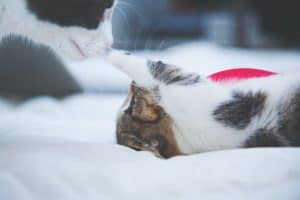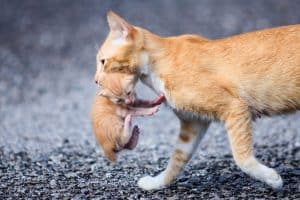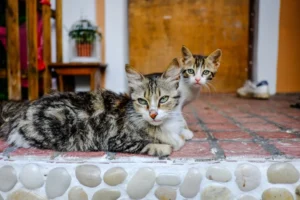Cats are known for their vocalizations, often meowing to communicate various needs and desires. One common reason why cats meow is to get attention from their owners. But why do they do this? Let’s explore the reasons behind why cats meow for attention.
Exploring the Reasons Behind a Cat’s Meow for Attention
The Nature of Cat Communication
Cats are not just meowing to hear themselves talk – there’s a method to their madness. Meowing for attention is a natural form of communication for our feline friends. From a young age, kittens meow to their mother for nourishment, warmth, and protection. As they grow, cats carry this behavior into their adult years, using meows to signal their needs and desires to their human companions.
Meowing serves as a way for cats to grab our attention and communicate their wants and needs. Whether they’re hungry, lonely, or craving affection, cats meow to express themselves when words fail. Understanding their meows can help strengthen the bond between you and your furry friend. So next time Fluffy meows at you, pay attention – they might just be trying to tell you something important.
Socialization and Bonding
When cats meow for attention, it’s not just about getting what they want – it’s also a way for them to bond with their human family. Through meowing, cats build a social connection with us, creating a sense of closeness and trust. By responding to their meows with love and care, we reinforce the bond we share with our feline companions.
Meowing for attention is a way for cats to seek comfort, security, and companionship from their human family. It’s their way of saying, “I need you” and “I love you.” So the next time your cat meows at you, take a moment to engage with them. Your response not only fulfills their immediate needs but also strengthens the special bond you share. Embrace the meows – they’re a language of love from your feline friend.
Emotional Needs of Cats
Cats meow for attention because they have emotional needs just like humans do. When they meow, they are seeking companionship, comfort, and connection to their owners. By responding to their meows with affection and attention, you are fulfilling their need for emotional support.
It’s important to remember that cats are social creatures, despite their independent nature. They form strong bonds with their owners and rely on them for love and reassurance. When a cat meows for attention, it’s often because they are looking for that emotional connection with you.
Next time your cat meows for attention, try to respond with love and understanding. Spend some quality time petting and playing with them to show that you care. Meeting their emotional needs will strengthen your bond and make for a happier, more contented kitty.
Environmental Influences
Various environmental influences can cause cats to meow for attention. Boredom, stress, or changes in their routine can all contribute to increased vocalization. If your cat is meowing more than usual, it’s essential to consider these factors to address the root cause.
To combat boredom, provide your cat with interactive toys, scratching posts, or even a window perch to keep them engaged and entertained. Establishing a consistent routine and providing a safe and comfortable environment can help reduce stress and decrease excessive meowing.
Additionally, ensuring your cat has enough mental and physical stimulation can prevent attention-seeking behavior. Engage in regular play sessions, offer puzzle feeders, or create a stimulating environment with hiding spots and climbing structures.
By understanding and addressing these environmental influences, you can help minimize your cat’s meowing for attention and create a harmonious living environment for both of you.
Additional Unique Insight:
- Creating a routine for feeding, playtime, and interactions can help satisfy your cat’s need for predictability and structure, reducing excessive meowing.
Training and Positive Reinforcement
Does your cat constantly meow for attention? Training them to seek it in more positive ways can make a big difference. When your cat meows excessively, try not to give in to their demands right away. Instead, wait for a moment of quiet, then reward them with a treat or pets. This teaches your cat that quiet behavior is what gets them the attention they crave. Consistency is key here – don’t give attention when they are meowing, as it can reinforce this behavior.
Interactive Play and Enrichment Activities
Interactive play and enrichment activities are essential in keeping your cat mentally stimulated and reducing their attention-seeking meows. Cats are natural hunters, so engaging them in play that mimics hunting can help satisfy their instincts. Invest in interactive toys like feather wands or puzzle feeders to keep them entertained. Providing scratching posts and climbing trees can also give them a sense of adventure without resorting to excessive meowing.
Key tip: Remember to rotate toys and activities regularly to prevent boredom and keep your furry friend engaged.
Seeking Professional Help
If your feline friend’s meowing seems excessive and out of the ordinary, it might be time to seek professional help. While occasional meowing is normal, persistent and intense meowing could indicate underlying health issues or behavioral problems. Don’t hesitate to consult your veterinarian to rule out any potential medical issues, such as pain, anxiety, or hyperthyroidism, that might be causing your cat’s heightened vocalization.
When it comes to behavioral problems, a certified animal behaviorist can provide valuable insights and recommendations to address your cat’s meowing. They can help you understand the root cause of the behavior and develop a tailored plan to modify it effectively. Remember, seeking professional help is not a sign of weakness but a proactive step towards improving your cat’s wellbeing and fostering a harmonious relationship.
Fun Facts About Cat Meowing
- Cats meow primarily to communicate with humans, not other cats. This behavior has evolved as a way for cats to interact with their human companions.
- Kittens meow to their mothers but stop once they are weaned, reserving the meow as a means of communication with humans.
- Cats have a wide range of meows with different meanings, from a short “hello” meow to a long, plaintive meow indicating distress or hunger.
- Some cats develop unique meowing patterns based on their environment and interactions, creating a personalized language with their owners.
Next time your furry friend starts meowing for attention, remember that they are trying to communicate with you in their unique way. By understanding the reasons behind their vocalizations, you can strengthen your bond and provide the best care for your beloved cat.
Alex, a passionate animal lover, has experience in training and understanding animal behavior. As a proud pet parent to two dogs and three cats, he founded AnimalReport.net to share insights from animal experts and expand his knowledge of the animal kingdom.




